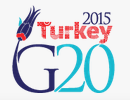At the Antalya Summit, the G20 leaders discussed inclusiveness, investment and implementation – themes based on the Turkish Presidency's priorities – as well as sustainable development and climate change in the run-up to the 21st session of the Conference of the Parties (COP 21) to the UNFCCC.
 16 November 2015: At the Antalya Summit, leaders from the Group of 20 (G20) discussed inclusiveness, investment and implementation – themes based on the Turkish Presidency’s priorities – as well as sustainable development and climate change in the run-up to the 21st session of the Conference of the Parties (COP 21) to the UNFCCC.
16 November 2015: At the Antalya Summit, leaders from the Group of 20 (G20) discussed inclusiveness, investment and implementation – themes based on the Turkish Presidency’s priorities – as well as sustainable development and climate change in the run-up to the 21st session of the Conference of the Parties (COP 21) to the UNFCCC.
The Leaders Summit, held from 15-16 November 2015, in Antalya, Turkey, concluded with the adoption of a communiqué in which the G20 leaders assert they are “strongly committed” to implement the 2030 Agenda for Sustainable Development and the Addis Ababa Action Agenda (AAAA). They note their adoption of the ‘G20 and Low Income Developing Countries Framework’ to strengthen dialogue and engagement on development, and announce they will develop an action plan in 2016 to further align G20’s work with the 2030 Agenda.
On climate change, the G20 leaders “reaffirm the below 2°C goal as stated in the Lima Call for Action.” They affirm their determination to adopt “a protocol, another legal instrument or an agreed outcome with legal force under the UNFCCC that is applicable to all Parties,” and underscore their commitment to reaching “an ambitious agreement in Paris that reflects the principle of common but differentiated responsibilities (CBDR) and respective capabilities, in light of different national circumstances.” They also affirm that the expected Paris agreement should be “fair, balanced, ambitious, durable and dynamic.” The leaders reaffirm that UNFCCC is the primary international intergovernmental body for negotiating climate change.
The communiqué also recognizes that “actions on energy, including improving energy efficiency, increasing investments in clean energy technologies and supporting related research and development activities will be important in tackling climate change and its effects.” In this context, the G20 leaders agree to further support, on a voluntary basis, the 2015 outcomes of existing work streams on efficiency and emissions performance of vehicles, as well as financing for energy efficiency, and reaffirm their commitment to “rationalise and phase-out inefficient fossil fuel subsidies that encourage wasteful consumption, over the medium term, recognising the need to support the poor.”
They invite all States according to their individual capacities to scale up their assistance to relevant international organizations, in order to enhance their capabilities to assist affected countries in dealing with the refugee crisis, while encouraging the private sector and individuals to also join in the international efforts to respond to the refugee crisis.
Addressing the G20 Summit, UN Secretary-General Ban Ki-moon underlined four elements for success in Paris at COP 21: durability – Paris should send a clear signal to markets that the low-carbon transformation of the global economy is inevitable and beneficial; flexibility – the agreement should be able to accommodate changes in the global economy while striking a balance between the leadership role of developed countries and the increasing responsibilities of developing countries; solidarity – developed countries must keep their pledge to provide US$100 billion a year by 2020 for both adaptation and mitigation; and credibility – through strong monitoring mechanisms that include regular, short cycles for governments to review and strengthen commitments in line with science and in response to rapidly escalating climate impacts. Ban noted a strong emerging consensus that the monitoring should be done every five years, with the first review coming before 2020.
The Secretary-General paid tribute to Turkey, Jordan and Lebanon for hosting four million Syrian refugees, and called for the G20 Leaders to ensure enhanced support to these and other countries accommodating the greatest numbers of refugees. He strongly appealed to European countries coping with mass forced displacement not to reduce official development assistance (ODA) to finance the cost of refugee flows, and stressed that “helping people in need should not be a zero sum game.”
The members of the G20 are: Argentina, Australia, Brazil, Canada, China, France, Germany, India, Indonesia, Italy, Japan, the Republic of Korea, Mexico, the Russian Federation, Saudi Arabia, South Africa, Turkey, UK, US and EU. [UN Press Release, 14 November] [UN Press Release, 15 November] [UN Secretary-General Remarks at Working Lunch, 15 November] [UN Secretary-General Press Conference, 15 November] [Global Environment Facility (GEF) Press Release] [G20 Leaders’ Communiqué]